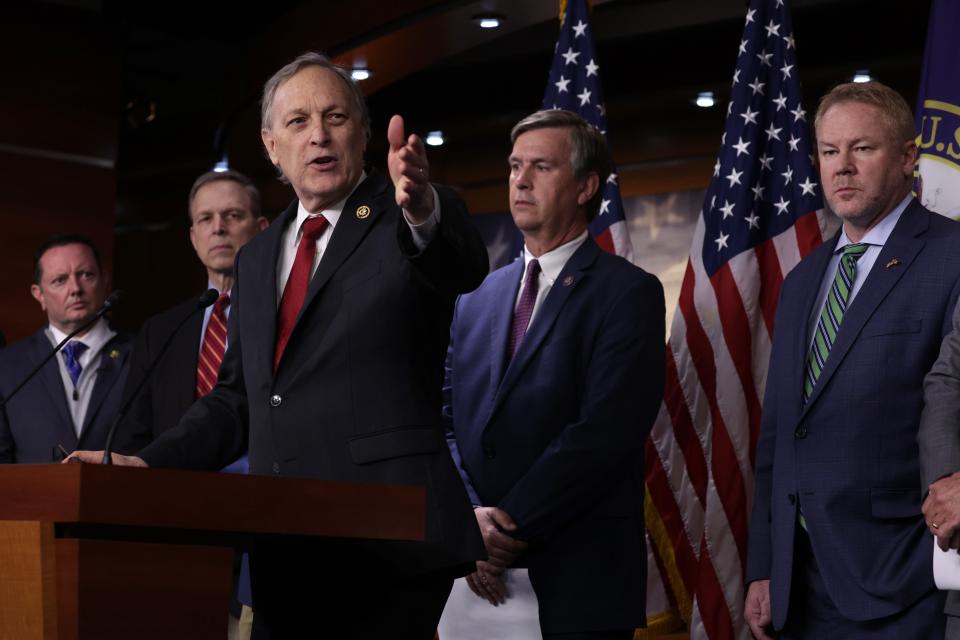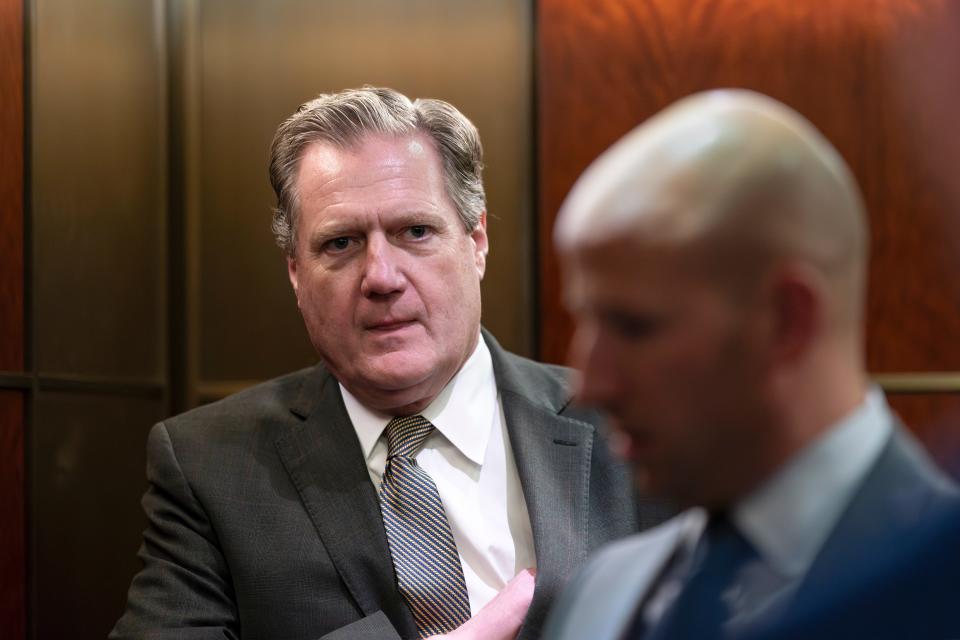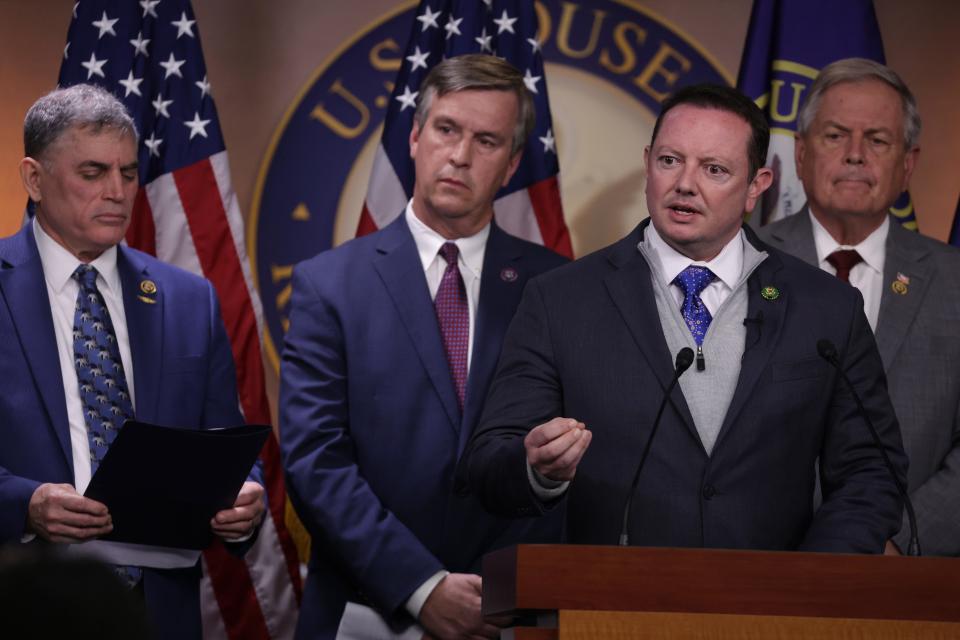Right-wing lawmakers say their fellow Republican's warning about a 'serious' security threat was a ploy
- Oops!Something went wrong.Please try again later.
WASHINGTON – A Republican lawmaker issued a stark warning about a "serious national security threat" on Wednesday. Now, his hard-right colleagues are alleging the message that roiled Capitol Hill was overblown in an effort to secure divisive foreign aid and preserve a controversial spying law.
House Intelligence Chairman Mike Turner, R-Ohio, released a cryptic statement Wednesday saying he shared information about the threat to all members of Congress. U.S. officials later confirmed that they have new information indicating Russia hopes to put a nuclear weapon in space.
The blowback was immediate: The top-ranking Democrat on the House Intelligence Committee, Rep. Jim Himes, D-Conn., told reporters “people should not panic” and suggested "we actually not say anything.” The leaders of the Senate Intelligence Committee released a statement urging caution “about potentially disclosing sources and methods.”
The ominous warning caught even House Speaker Mike Johnson, R-La., off guard, according to a person familiar with the matter. They said Turner did not give the speaker’s office a heads up ahead of the public statement.
On Thursday, members of Republicans’ right-wing faction claimed their colleague was inflating a potential national security issue to drum up support for a controversial spying law known as FISA and a $95 billion international aid package that passed in the Senate earlier this week.

House Freedom Caucus member Rep. Andy Ogles, R-Tenn., sent a letter to Johnson Thursday calling for an investigation into Turner’s comments.
“In hindsight, it has become clear that the intent was not to ensure the safety of our homeland and the American people, but rather to ensure additional funding for Ukraine and passage of an unreformed Foreign Intelligence Surveillance Act (FISA),” he alleged, referencing the law that is up for reauthorization in Congress.
Ogles later told USA TODAY he believes “it’s clear” that the warning came at a time meant to influence the legislation.
“It’s an election year. I understand you’re going to have political rhetoric on both sides, but there’s one committee that has to rise above that, and that’s the Intelligence Committee,” he said. “They used political agendas to scare the American people.”
Rep. Andy Biggs, R-Ariz., told USA TODAY: “I think he’s right on the money.”
“This is the Intelligence Chairman abusing his power, trying to stop us,” he said, referencing bipartisan legislation he’s sponsored that would overhaul FISA.
“I suspect that the timing – to use my daughter’s phrase, it’s a little ‘sus,’” said Rep. Eric Burlison, R-Mo., referencing a slang term for the word "suspicious." “It’s a strong coincidence that this happened around the same time.”
Rep. Matt Gaetz, R-Fla., said on Rumble that he viewed the intelligence and called it “incredibly irresponsible” for Turner to “gaslight the country” about the threat.
However, Turner defended the decision in a statement Thursday, saying he consulted with the Biden administration before releasing the alert.
“White House officials confirmed that, in their view, the matter was ‘serious,’” he said.
He later told reporters after meeting with National Security Advisor Jake Sullivan that "we believed that it was important enough to notify the other members of Congress of this."
But National Security Council spokesperson John Kirby told reporters Thursday any allegation the White House "gave a green light for this information to get public" is "false."

House Republicans have long fractured over additional U.S. funding for Ukraine, which a significant portion of the Republican Party opposes. That includes the ultraconservative Freedom Caucus members raising concerns about Turner’s statement.
The prospects for the Senate-passed international aid package, which would provide support to Israel, Ukraine and other allies, also faces challenges from the left, particularly lawmakers who oppose funding for Israel without human rights conditions.
Johnson has said the package will not get a vote on the House floor because it lacks border security measures. But there's still immense pressure from the White House, Democratic and Republican leaders in the Senate and the House's moderates to advance additional aid.
House Republicans have also been bitterly divided over the reauthorization of the foreign surveillance program, with the bulk of the grievances over Section 702. That's a part of the law that allows the U.S. government to collect data on the communications of foreigners outside of the U.S.
Section 702 has drawn considerable criticism from libertarian-minded conservative Republicans and progressive Democrats, who argue the law currently allows the government to collect data from Americans as well.
The law also allows the government to search through its database without a warrant, which has sparked significant pushback from critics. Members of the House Judiciary Committee have spearheaded the efforts to reform FISA.
But proponents of the law, who largely come from the House Intelligence Committee, say that Section 702 is essential for preserving national security. Requiring a warrant for all searches through data collected under Section 702, they argue, would effectively neuter the program.
Republicans have struggled to find common ground on the immensely complicated legislation. Johnson has already had to pull back consideration of a FISA bill from the House floor twice as debates rage on in the lower chamber. Lawmakers have until mid-April – when Section 702 expires – to address its reauthorization.

This article originally appeared on USA TODAY: Lawmakers say warning about 'serious' security threat was a ploy

